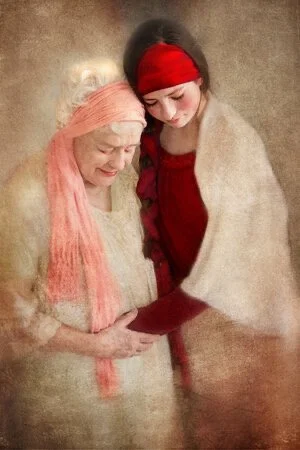Lord, teach me to walk in Your paths!
Today Mary is presented to us as the pilgrim... from Nazareth to the home of Zechariah and Elizabeth: this is the first of Mary's journeys of which Sacred Scripture speaks. The first of many. Mary will go from Galilee to Bethlehem, where Jesus will be born; she will be forced to flee to Egypt to save the Child from Herod; every year she will make a pilgrimage to Jerusalem for the feast of Passover until the last journey on which she will follow his Son to Calvary. These journeys have one feature: they have never been easy, they required courage and patience. They tell us that Our Lady knows what pilgrimage is, she knows our uphill paths: she is our sister in life's journeys. Experienced in hardship, she knows how to take us by the hand when we have no strength, when we are facing the steepest bends of life.
We can only guess what happened in the heart of the Blessed Virgin Mary after the Annunciation. Perhaps she still could not believe what had happened. Learning from the archangel Gabriel about the blessed condition of her relative Elizabeth, she immediately understood it as a task for herself. If someone is in need, help should be given. She does not hesitate to go on a long journey to Ain Karem, because her heart dictates so. The Evangelist mentions the haste with which Mary set out, which suggests decisiveness and a sense of responsibility. Many times, in our Marian devotion, we refer to this attitude of Mary, trusting that she will also willingly come to the aid in our needs. How many perfect tips for us only in this fragment of the story. Mary herself shows us the evangelical ideal of love of neighbor. Perhaps she will soon need help herself, but she does not pay attention to herself, only thinks about others who need help.
Many things can be considered about Mary's journey from Nazareth to Ain Karem. Certainly, these 150 km of journey, traveled on foot, was an opportunity to meditate on the event of the Annunciation, even if Mary did not make this journey alone. In the Gospel account mountains are mentioned. Of course, these are not the proverbial Himalayas, but they clearly suggest the difficulty of overcoming them, which was related to the journey. Sometimes, in order to reach our neighbor with concrete help, we too have to work hard, to overcome the "mountains" of self-love, indifference, laziness, aversion, helplessness, shame, humiliation, etc.
The moment of the meeting between Mary and Elizabeth is exceptional. Elizabeth, filled with the Holy Spirit, speaks to Mary words that she was unable to deduce through human logic. It may surprise that she has knowledge of Mary's condition and her divine election, before Mary could explain anything. This is certainly a prophetic understanding of reality that comes from God and confirms for Mary the words of the Annunciation. The whole meeting takes place in an atmosphere of joy, exultation: the baby in Elizabeth's womb leapt of joy, she herself, full of ecstasy, uttered a cry of joyful wonder at Mary's greetings, and Mary says that her spirit rejoices in God her Savior.
Seeing the joy of this encounter with Jesusand the joy of other meetings of the Gospel heroes, we must ask ourselves about our daily meetings with our loved ones. Observing today's world, one notices that it is full of dissatisfaction, bitterness and resignation. But joy is not vanity or the luxury of spiritual life, but its culmination. Joy is not an utopia or an impossible thing. It is not spiritual infantilism, but rather the result of total dedication to God. The foundation of joy is neither what we do nor what others offer us, but the Person of Jesus, our Bridegroom and Friend. Joy is the reflection of the soul that feels that God is near. The movement of the Child in the womb of St. Elizabeth is caused by the presence of the Savior.
We should read in this event a practical suggestion that every encounter with another person should be essentially an encounter with Christ, who dwells in him and of whom he is an image. The other person must also feel the presence of Jesus, whom we bring to him and who is present where "two or three are gathered in his name". To bring Jesus to our brothers and sisters like Mary: this is the task we have as Christians. It is about our attitude of acceptance, sensitivity, interest, compassion, readiness to help, in other words, love, which creates space for making God present among us.
There is a story narrated by Fr. Henri Nouwen. A prior student of his came to visit him. The student told him that when he looked at Fr. Henri he saw Christ. Nouwen replied, “It is the Christ in you that sees the Christ in me.” It is peace.
Until Tomorrow
fr. george


